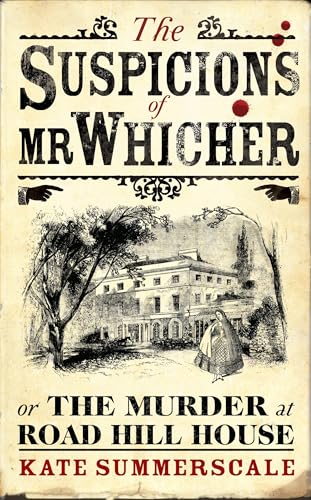Top Ten Non-fiction Award Winners
Discover the top ten award-winning non-fiction books that captivate and inspire. Explore this curated list of acclaimed titles celebrated for their excellence in storytelling and impact.

Book
The Suspicions of Mr. Whicher
by Kate Summerscale
The dramatic story of the real-life murder that inspired the birth of modern detective fiction.

Book
The Looming Tower
by Lawrence Wright
NATIONAL BESTSELLER • PULITZER PRIZE WINNER • A “heart-stopping account of the events leading up to 9/11” (The New York Times Book Review), this definitive history explains in gripping detail the growth of Islamic fundamentalism, the rise of al-Qaeda, and the intelligence failures that culminated in the attacks on the World Trade Center. One of the New York Times’s 100 Best Books of the 21st Century In gripping narrative that spans five decades, Lawrence Wright re-creates firsthand the transformation of Osama bin Laden and Ayman al-Zawahiri from incompetent and idealistic soldiers in Afghanistan to leaders of the most successful terrorist group in history. He follows FBI counterterrorism chief John O’Neill as he uncovers the emerging danger from al-Qaeda in the 1990s and struggles to track this new threat. Packed with new information and a deep historical perspective, The Looming Tower is a sweeping, unprecedented history of the long road to September 11.

Book
Legacy of Ashes
by Tim Weiner
With shocking revelations that made headlines in papers across the country, Pulitzer-Prize-winner Tim Weiner gets at the truth behind the CIA and uncovers here why nearly every CIA Director has left the agency in worse shape than when he found it; and how these profound failures jeopardize our national security.


Book
Slicing the Silence
by Tom Griffiths
The author reflects on his experiences exploring Antarctica, the last true wilderness.

Book
Come Hell or High Water
by Michael Eric Dyson
When Hurricane Katrina tore through New Orleans and the Gulf Coast, hundreds of thousands were left behind to suffer the ravages of destruction, disease, and even death. The majority of these people were black; nearly all were poor. The Federal government's slow response to local appeals for help is by now notorious. Yet despite the cries of outrage that have mounted since the levees broke, we have failed to confront the disaster's true lesson: to be poor, or black, in today's ownership society, is to be left behind. Displaying the intellectual rigor, political passion, and personal empathy that have won him acclaim and fans all across the color line, Michael Eric Dyson offers a searing assessment of the meaning of Hurricane Katrina. Combining interviews with survivors of the disaster with his deep knowledge of black migrations and government policy over decades, Dyson provides the historical context that has been sorely missing from public conversation. He explores the legacy of black suffering in America since slavery and ties its psychic scars to today's crisis. And, finally, his critique of the way black people are framed in the national consciousness will shock and surprise even the most politically savvy reader. With this clarion call Dyson warns us that we can only find redemption as a society if we acknowledge that Katrina was more than an engineering or emergency response failure. From the TV newsroom to the Capitol Building to the backyard, we must change the way we relate to the black and the poor among us. What's at stake is no less than the future of democracy.


Book
Imperial Reckoning
by Caroline Elkins
Reveals how the British colonial government detained more than one million members of Kenya's largest ethnic minority in prisons and work camps where many met their deaths as a result of a British attempt to stop the Mau Mau uprising.

Book
Imperial Life in the Emerald City
by Rajiv Chandrasekaran
NEW YORK TIMES BESTSELLER • National Book Award Finalist • This "eyewitness history of the first order ... should be read by anyone who wants to understand how things went so badly wrong in Iraq” (The New York Times Book Review). The Green Zone, Baghdad, Iraq, 2003: in this walled-off compound of swimming pools and luxurious amenities, Paul Bremer and his Coalition Provisional Authority set out to fashion a new, democratic Iraq. Staffed by idealistic aides chosen primarily for their views on issues such as abortion and capital punishment, the CPA spent the crucial first year of occupation pursuing goals that had little to do with the immediate needs of a postwar nation: flat taxes instead of electricity and deregulated health care instead of emergency medical supplies. In this acclaimed firsthand account, the former Baghdad bureau chief of The Washington Post gives us an intimate portrait of life inside this Oz-like bubble, which continued unaffected by the growing mayhem outside. This is a quietly devastating tale of imperial folly, and the definitive history of those early days when things went irrevocably wrong in Iraq.